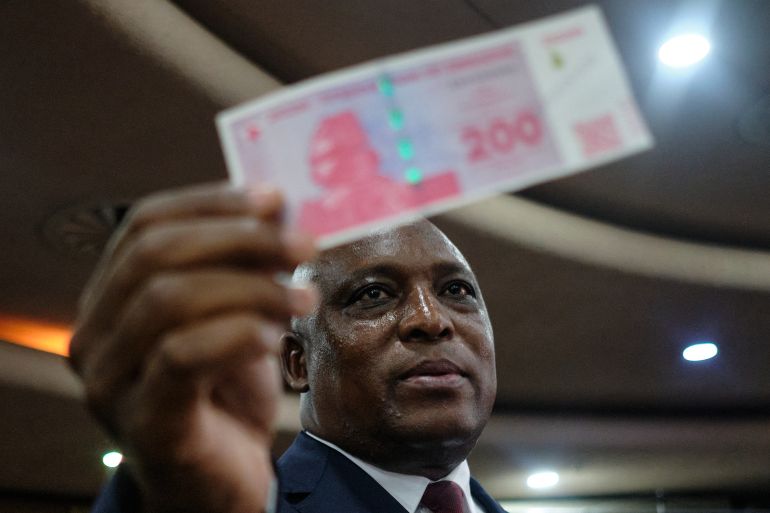Harare, Zimbabwe – Kenias Mutsenha had long ceased using his Zimbabwean local currency bank account, abandoning it for one trading in US dollars, as many in the economically volatile country prefer dealing with more stable foreign currencies.
But when he took on consultancy work in Harare this year and a client needed to pay him in Zimbabwe Gold, or ZiG, currency, he returned to the bank to reopen his account. There, the teller asked for a reactivation fee in ZiG notes. Again, Mutsenha only had US dollars, which the bank would not accept or exchange.
Recommended Stories
list of 3 itemsend of list
“I had to find cash somewhere,” Mutsenha, 46, said, realising there was only one place he could go: “The streets”.
While most Zimbabweans prefer trading in US dollars – to avoid the pitfalls of major currency fluctuations – government institutions use local currency. At the same time, banks don’t have enough ZiG notes, as the Central Bank – wanting Zimbabwe to move towards a cashless society – has not put enough cash in circulation, experts say.
As a result, people flock to Harare’s central business district (CBD), where there is a thriving black market foreign exchange trading operation.
Since the launch of the ZiG last year, the government has been clamping down on informal currency dealers. But this has only created a situation where the suppliers find new avenues to explore – as Mutsenha discovered that day.
Finding local currency on the street was a nightmare, he said. “I wandered in the CBD until one illegal forex dealer [who said he had no cash] directed me to a certain street. I was told the person [exchanging money] is disabled on a wheelchair.”
On a bustling street corner, Mutsenha found Leonard Mumba*, who used to sell mobile phone airtime at a local bus terminus but now deals in something far more lucrative, secretive, and risky.
Every day except Sundays, 43-year-old Mumba is wheeled into town by a relative. He works from about 7am to 6pm from the same spot on the corner, and is paid a weekly commission by the black market dealer who hired him.
As Mutsenha handed over his US dollar note to Mumba, he observed the subtle operations of this trade. “A man came from across the road, walking, passing by the street corner. He just dropped a black satchel at this illegal forex dealer and hooked it on the wheelchair. They did not speak to each other,” Mutsenha recounted.
All across the capital city, dealers like Mumba now sit in wheelchairs and on sidewalks with satchels of banknotes. Silent handoffs are not uncommon to witness: A plastic bag tossed casually at a trader’s feet as a supplier walks by, avoiding eye contact and accountability.

Police are more ‘lenient’
After the 2024 introduction of the ZiG and the associated government crackdown on illegal money traders, an increasing number of people with disabilities have taken up the trade in Harare, observers and disability rights groups say.
Although there are no clear estimates of how many people with disabilities work as black market dealers, Plaxedes Choto, a disability activist, told Al Jazeera that in the CBD alone, there are more than three dozen disabled people involved in the trade.
While some have approached the trade organically, others, like Mumba, were recruited to be proxies for someone else.
“I used to sell airtime at Copacabana bus terminus, but when police continued rounding up the money changers, one of the suppliers approached me to work for him,” Mumba told Al Jazeera from his street corner.
“Due to my condition [being in a wheelchair], police would not easily suspect me, especially in the beginning,” he said. “And they are lenient on arrest due to our circumstances.”
People with disabilities may be overlooked or viewed more sympathetically by the police, who are less likely to crack down on them, according to observers. Thabiso Moyo, a Harare-based social justice activist and human rights defender, told Al Jazeera this is because police stations are often not disability friendly, which creates hassles for the officers.
“Being generally spared from police raids then creates a situation which allows wheelchair users to be shields and proxies in a broader system of economic survival and corruption. Real culprits hide behind the disabled.”
Moyo notes that the shift to front-lining disabled money traders is a tactic that allows the real suppliers of illicit street currency to stay behind the scenes and be more protected.
Despite their work with sought-after US dollars, observers say there are seldom reports of disabled money traders being robbed by thieves. However, many traders say law enforcement agents approach them for bribes in exchange for allowing their operations to continue.
Despite any risks, for many, including Mumba, the benefits of the job outweigh previous economic ventures. “With airtime and fruits it was quite a hustle. And now everyone wants money – cash or online transfers, both in USD and ZiG. It’s a lucrative business and I could not deny such a [job] offer.”
Not too far away, Clever Gorejena*, another street currency dealer, has been in a wheelchair since an accident a decade ago left him disabled. He dabbles in the trade to make additional income.
Like Mumba, he works for someone else and is paid weekly on commission based on the profits from the transactions he makes.
“I took the offer as an opportunity to make money. I deal in both hard currency and online transactions using my phone. In addition to forex exchange, I also sell airtime. Those are my two major activities,” he told Al Jazeera.

Lack of opportunities
People with disabilities face many hurdles in Zimbabwe, including a high cost of living due to additional care and resources they may require. On the streets of Harare, several told Al Jazeera about the stressful cost of diapers, food for their specific diets, special transport services, and a support person or aids to help them get by.
Although Zimbabwe’s social welfare department gives monthly grants to people with disabilities, representatives of this community say it is a drop in the ocean. Employment prospects also remain a challenge. In 2021, Zimbabwe launched a national disability policy to close the gaps between disabled and able-bodied Zimbabweans. The policy stated the government’s intention for inclusion, including employment opportunities, but four years down the line, the community say they are still excluded and often exploited.
For many, this has led to begging or vending to earn money. According to a 2017 study by the National Association of Social Workers, 57 percent of people begging in Harare have a physical disability.
“Beggars with disabilities have a low level of education. Forty-seven percent have no formal education. This has made it difficult for them to get employed,” said the report.
As people attempt to leave begging, many are drawn to the informal sector because of the challenging economic situation, said Samantha Sibanda, the director of Signs of Hope Trust, an organisation for people with disabilities. Some fall into illegal currency dealing, while others sell what they can in the street.
“I think the national budget and other economic outlooks have shown that, generally, we have now moved to an informal economy,” said Sibanda. “But for persons with disabilities, the challenges are unique,” she added, including insufficient access to education, as few schools provide accessible infrastructure. This then affects their chances of getting a formal job. And even for the employed, workplace discrimination remains a challenge.
“This is a huge gap in inclusion. Our infrastructure was built without the disabled in mind,” Sibanda said. “The majority of the disabled find their way to city centres, in the streets or vending due to lack of opportunities.”

‘We meet in the streets’
In August, the Harare City Council conducted Operation Restore CBD Order, during which officials inspected shops and buildings to ensure their businesses were complying with the law.
The city council told Al Jazeera that although it was aware that disabled people are working in the illegal money trade in Harare, the current focus of its operation was on unlicensed shops and illegal infrastructure in the greater CBD.
“But anyone operating any business within the CBD without regulation through the City of Harare is illegal, including those in the streets,” added Stanley Gama, the city’s spokesperson.
Other concerned stakeholders say that despite government efforts to fight illegal forex trade, currency shortages and bureaucracy in the banking system drive the black market operation.
In Zimbabwe, changing foreign currency to local notes the official way is a long process, involving paperwork and banks asking for detailed information. Meanwhile, changing ZiG to foreign currency requires Central Bank approval and is near impossible, locals say. So many choose to go the black market route.
Ngonidzashe Mutsigo, a Harare resident, mentions other challenges for Zimbabweans.
“I don’t have a bank account; it costs to maintain a bank account in Zimbabwe. It costs to withdraw and transact using the bank account. So I think such things are the ones that make the business of informal money changing blossom,” he said.
“Unfortunately, even for those with bank accounts, when they want to buy the USD in the bank, they don’t get it, and we meet in the streets.”
A black-market money supplier who provides currency to disabled traders said that, these days, ZiG notes are scarce. As the ZiG is in demand, the supplier, who requested anonymity for security reasons, told Al Jazeera, black market suppliers often source it from big businesspeople.
“There are people in business and government getting tenders and paid in local currency – this is big money – millions. And the only way for them to get the USD is to come to the streets.”
Even though the government pays in local currency, the “big shots” want US dollars, he said.
“We help them by looking for the greenback … and we work with our guys on the ground, including those with disabilities. We believe in numbers – the more we get these people, the quicker our money is turned into the sought-after USD.”

‘Tough times’
In June, the Reserve Bank of Zimbabwe (RBZ) reported that it had achieved one year of ZiG stability.
“Zimbabwe’s exchange rate has become more stable, with the difference between the official and black market rates now below 20 percent. The country also received more foreign currency … [This has] made it easier for businesses and individuals to access foreign currency for genuine needs, and helped keep the financial sector stable and healthy,” said RBZ governor, John Mushayavanhu.
Observers and financial experts, however, say the RBZ is not realistic about the situation on the ground, where US dollars are in demand and widely different exchange rates on the official and parallel markets have created opportunities for illegal dealers to thrive.
Meanwhile, on the streets, people with disabilities have been drawn in, too – many out of desperation or necessity.
“We are living in tough times,” Sign of Hope’s Sibanda said. “We do also have people who have been exploiting persons with disabilities since time immemorial, using them for begging, using them to run their stores while they keep their money for themselves.” Recruitment by money traders wanting to stay in the shadows is the newest iteration of that.
“Operating a parallel market of forex or currency exchange is illegal, and we do not condone such activities,” Sibanda said. “But we do look forward to other opportunities that can give people with disabilities better incomes and a better life.”
On his street corner, Mumba agrees. Despite some financial respite, he says currency trading does not provide real security – neither economic nor social. He hopes the government will roll out initiatives and invest in helping him and others get away from the criminal trade and unsafe streets of Harare.
“No one knows about tomorrow. Robbers can target me, here or at home, and it will affect my family,” Mumba said. “My biggest fear is that the work we do is illegal and does not help in building my country’s economy.”
*Name changed for safety reasons


